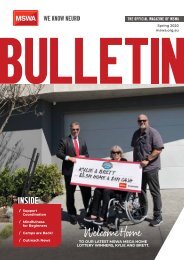MSWA Bulletin Magazine Spring 2021
What is assistive technology and how can it help you? | Good health monitoring practices | Pain and pain management series: Part 2 | Farewell Marcus Stafford
What is assistive technology and how can it help you? | Good health monitoring practices | Pain and pain management series: Part 2 | Farewell Marcus Stafford
Create successful ePaper yourself
Turn your PDF publications into a flip-book with our unique Google optimized e-Paper software.
This research project is investigating<br />
the bacteria within the gut and the<br />
relationship between gut health<br />
and clinical indicators of HD such<br />
as mood, weight, and thinking and<br />
memory.<br />
“Our study is completely remote,<br />
meaning that participants can<br />
do the study from home. We use<br />
online questionnaires, cognitive<br />
tasks via mobile app and telehealth,<br />
and ask for a faecal sample to be<br />
sent by post.<br />
Results of this research will provide<br />
the knowledge we need about<br />
the HD gut to make lifestyle<br />
recommendations and inform<br />
other interventions that can help<br />
with gastrointestinal symptoms (eg,<br />
change in diet, taking supplements<br />
such as probiotics).”<br />
This research project is funded by<br />
the Huntington’s Disease Society of<br />
America HD Human Biology Project<br />
Fellowship awarded to Dr Yifat<br />
Glikmann-Johnston.<br />
FROM MND AUSTRALIA<br />
Read more at: mndaustralia.org.au<br />
Phase 2/3 of the Copper-ATSM<br />
clinical trial will soon commence<br />
at Macquarie University, Sydney<br />
and then at other sites across<br />
Australia.<br />
The first clinical trial of copper-ATSM<br />
as a potential treatment option<br />
for motor neurone disease (MND)<br />
started recruiting in November<br />
2016.<br />
Copper-ATSM therapy was developed<br />
in Australia. Research has shown<br />
copper-ATSM can protect motor<br />
neurones in the spinal cord, improve<br />
MND-like symptoms, and extend<br />
the lifespan of mice with a mutated<br />
form of SOD1. It is more effective in<br />
mutant SOD1 mice than riluzole (the<br />
only approved treatment for MND).<br />
Phase 1 of the study, conducted at<br />
two sites in Australia, identified a<br />
safe dosage of copper-ATSM.<br />
The phase 2/3 trial will commence<br />
initially at Macquarie University<br />
in Sydney and then at other sites<br />
across Australia. Anyone interested<br />
in taking part in the trial will need to<br />
contact their neurologist to discuss<br />
suitability and eligibility.<br />
Phase 1 of the study recruited<br />
participants who have been<br />
diagnosed with sporadic or familial<br />
amyotrophic lateral sclerosis.<br />
Research to date has been<br />
conducted on familial MND animal<br />
models. There is no animal model<br />
for sporadic MND. However, in 2015<br />
Peter Crouch and colleagues at The<br />
University of Melbourne and the<br />
Florey Institute found MND-affected<br />
tissues obtained from people who<br />
died because of sporadic MND had<br />
important similarities to mice that<br />
responded to copper-ATSM. This<br />
suggests that copper-ATSM may<br />
have activity in both sporadic and<br />
familial MND.<br />
A possible treatment resulting from<br />
these studies is many years away.<br />
Phase 1 determined a safe dose of<br />
copper-ATSM. Data from this trial<br />
guided researchers in setting up<br />
the next phase of the trial.<br />
The Phase 2 Cu-ATSM clinical trial<br />
will involve 80 participants and<br />
evaluate efficacy (whether the<br />
compound works as intended) and<br />
further evaluate safety. Patients<br />
involved in this phase of the trial will<br />
be randomly assigned Cu-ATSM or a<br />
placebo for 6x28 day cycles.<br />
Motor Neurone Disease Research<br />
Australia has invested more than<br />
$1.2 million to support three<br />
projects that aim to assist<br />
developing copper-ATSM as a<br />
potential therapeutic for MND.<br />
WOULD YOU PREFER TO<br />
RECEIVE BULLETIN ONLINE?<br />
If you would like to opt-out of receiving a paper copy of this publication,<br />
please contact communications@mswa.org.au to sign up to the e-magazine.<br />
11

















